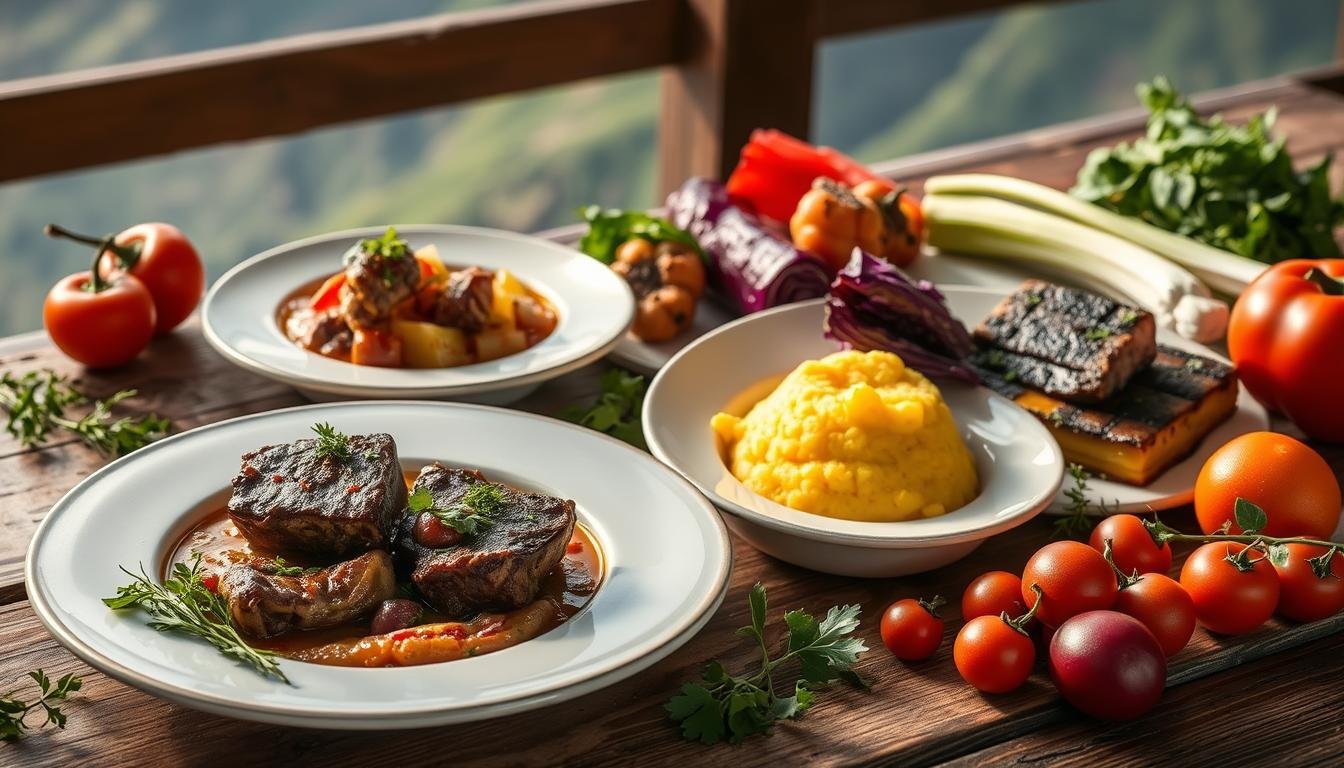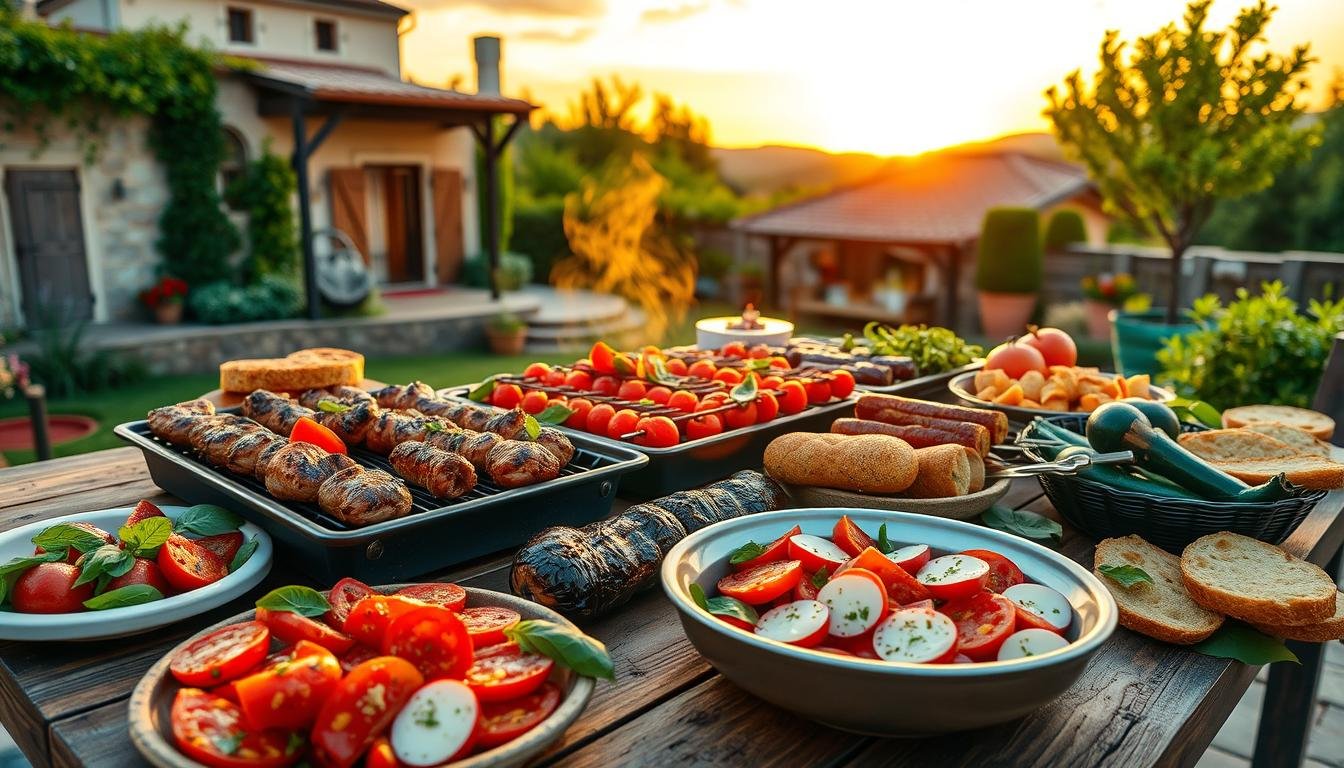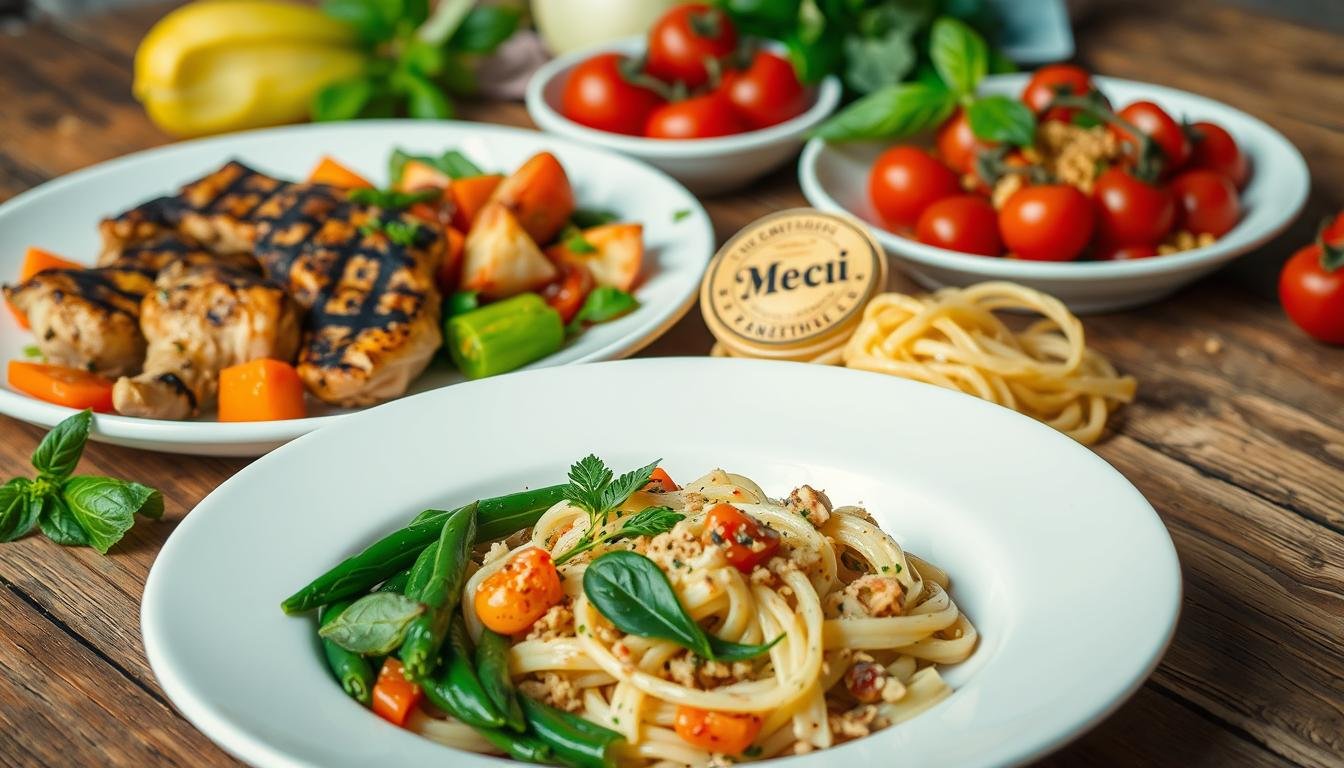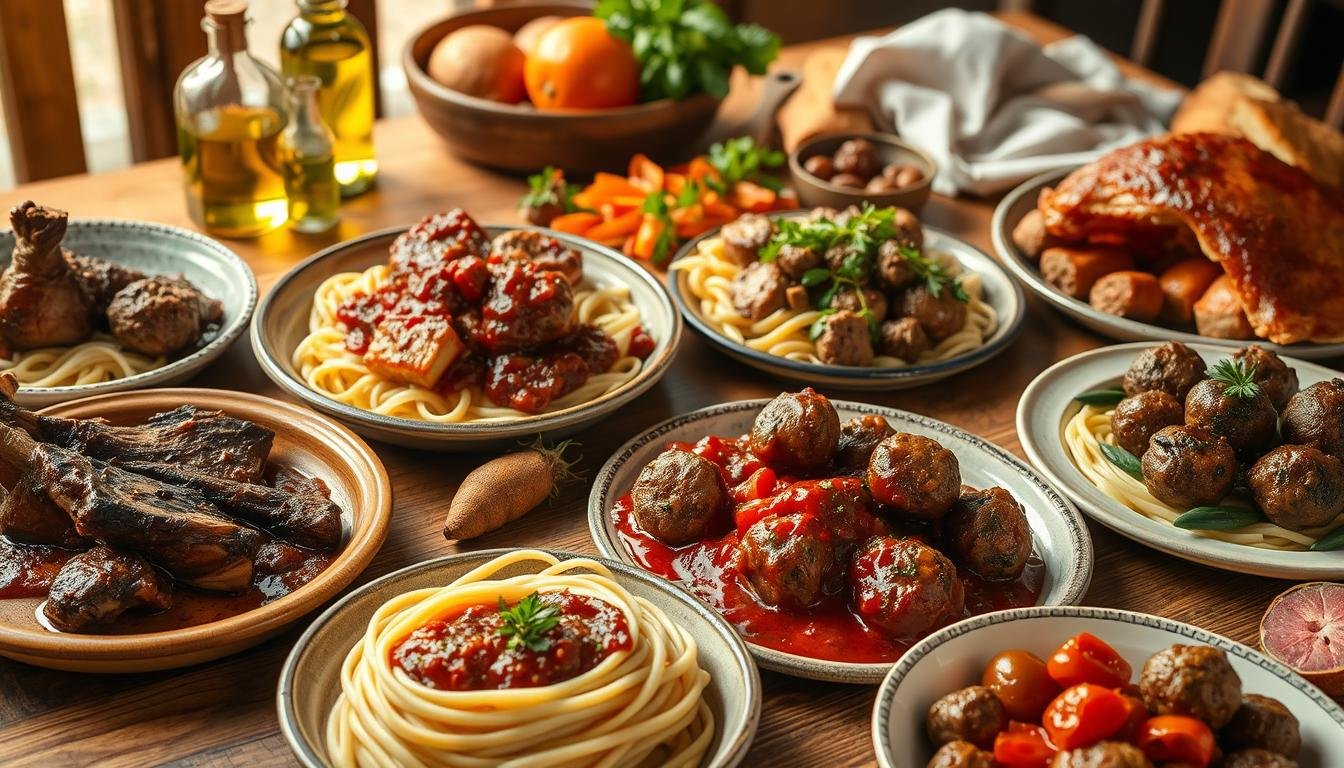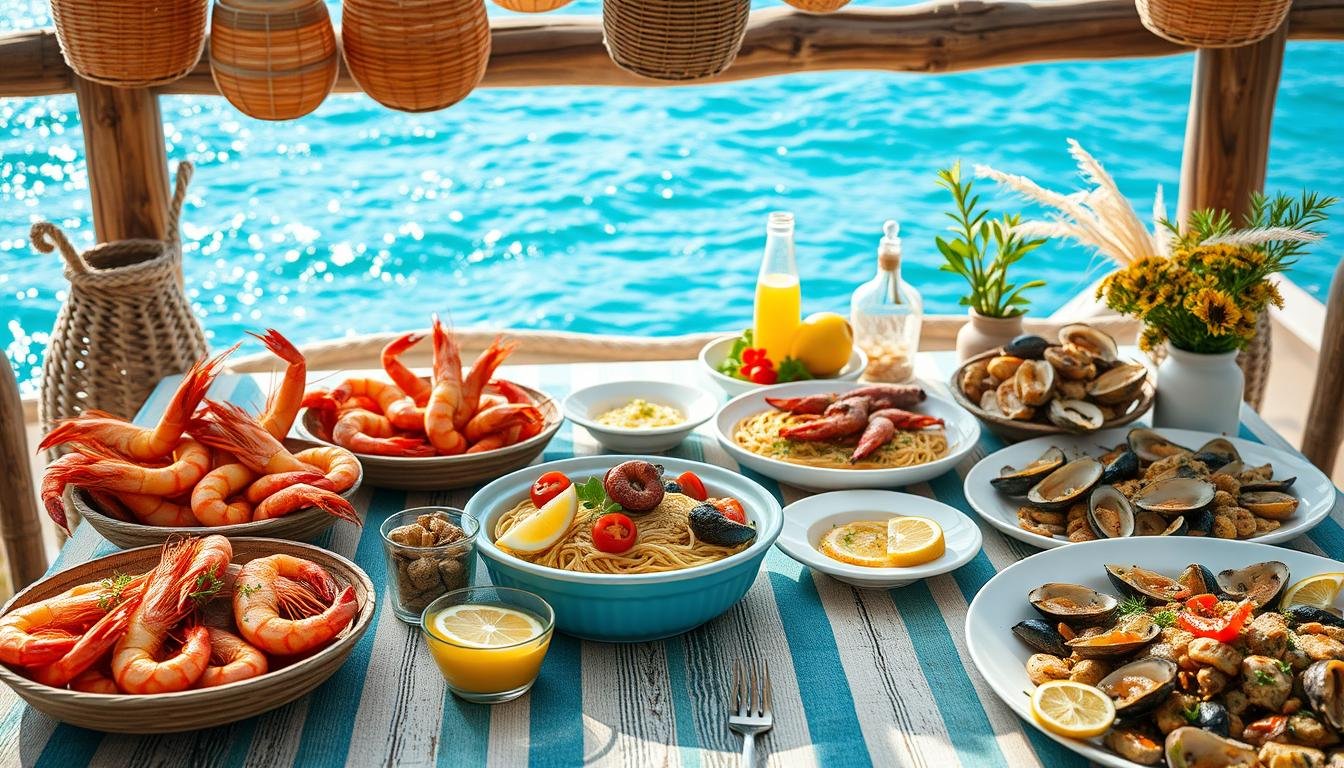Are you ready to explore the rich world of Northern Italian cuisine? We’ll dive into the secondi, or main courses, that make this region famous. You’ll discover dishes like Osso Buco and Branzino al Sale, each with its own unique taste and texture.
Northern Italian secondi are the heart of the region’s cooking traditions. They use fresh, local ingredients and skilled cooking methods. These dishes combine quality meats, seafood, and seasonal produce, making them both comforting and elegant.
Key Takeaways
- Northern Italian secondi are the region’s renowned main courses, showcasing a diverse range of flavours and textures.
- These dishes often feature high-quality meats, fresh seafood, and locally sourced ingredients that reflect the region’s culinary traditions.
- From the iconic Osso Buco to the delicate Branzino al Sale, Northern Italian secondi offer a mouthwatering exploration of the region’s exceptional gastronomy.
- Seafood and meat dishes are prominent in Northern Italian cuisine, with a strong emphasis on veal and beef preparations.
- The secondi menu also features a variety of vegetarian-friendly options, catering to diverse dietary preferences.
The Essence of Northern Italian Cuisine
Northern Italian cuisine is a mix of different culinary traditions. Each part adds to a rich and varied food experience. From the mountains of Valle d’Aosta to the seafood of Veneto, Italy’s north offers a wide range of tastes and ingredients.
Culinary Influences Across the Regions
The food of Northern Italy shows the area’s varied landscapes and history. In the mountains, like Piedmont and Lombardy, dishes often include butter, rice, and polenta. Near the sea, in Liguria and Emilia-Romagna, you’ll find seafood and fresh food dishes.
This mix of local ingredients and cooking methods has created many special dishes. These are the highlights of Northern Italian cuisine.
Key Ingredients in Northern Italian Dishes
- Risotto rice: The base of many famous Northern Italian dishes, like the creamy Risotto alla Milanese.
- Veal and beef: Known for their softness and taste, these meats are key in Northern Italian secondi, like Ossobuco alla Milanese.
- Pork: Used in many Northern Italian dishes, from the rich Brasato al Barolo to the tasty Porchetta.
- Freshwater fish: From the lakes and rivers, fish like trout and perch are celebrated in Northern Italian cooking.
Northern Italian cuisine is a rich mix of traditions and influences. Whether you try the creamy Ossobuco alla Milanese or a fresh Veneto seafood dish, it will impress you. The essence of Northern Italian cuisine is unforgettable.
Classic Secondi Dishes to Try
Exploring Northern Italy’s rich culinary traditions, the secondi, or main courses, shine brightly. These dishes are hearty and full of flavour, showing off the region’s renowned cuisine. From the famous Cotoletta alla Milanese to the rustic Pollo alla Cacciatora, these classics will delight your taste buds and take you to Italy’s charming streets.
Osso Buco: The Milanese Specialty
Osso buco is a beloved Milanese dish. It’s braised veal shanks cooked in a rich broth with white wine, vegetables, and a gremolata topping. The meat is so tender, it melts in your mouth, filling every bite with the comforting flavours of Northern Italy.
Pollo alla Cacciatora: Hunter’s Chicken
Pollo alla Cacciatora, or Hunter’s Chicken, is a rustic dish loved for its bold, herbal flavours. Chicken is cooked with tomatoes, onions, garlic, and herbs. It’s a dish that’s both satisfying and full of the Italian countryside’s essence.
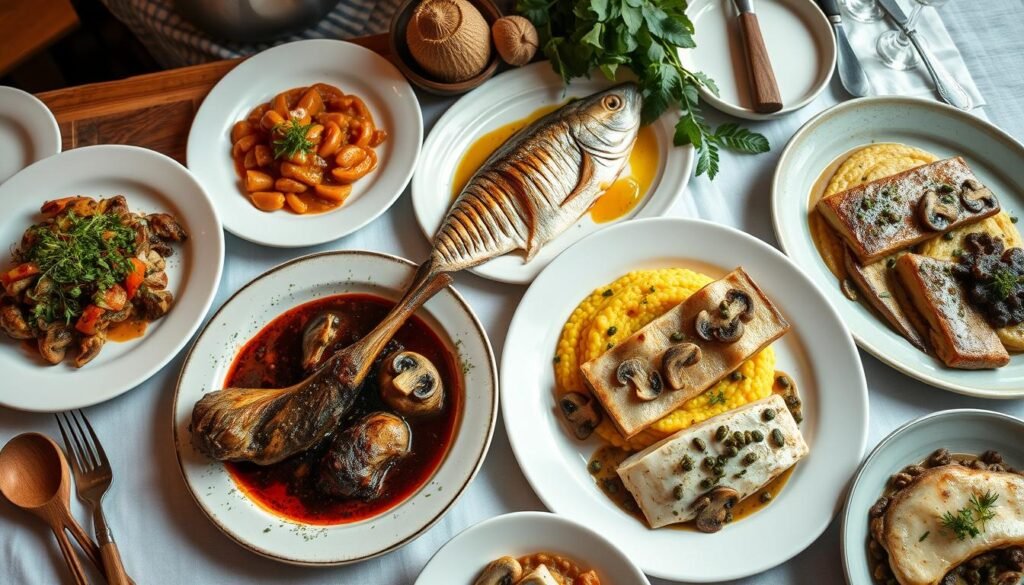
These traditional recipes, like Brasato al Barolo and Cotoletta alla Milanese, show the comforting side of Northern Italian cuisine. Each dish has its own unique flavour and offers a peek into the region’s culinary heritage. They’re a must-try for anyone who loves traditional recipes and Italian meat dishes.
Seafood Secondi that Delight
Northern Italy’s coastal areas are rich in seafood dishes. They highlight the Adriatic Sea’s bounty. Standout secondi include Branzino al Sale and Fritto Misto.
Branzino al Sale: Salt-Baked Sea Bass
Branzino al Sale celebrates the sea’s flavours. A sea bass is wrapped in salt and baked. This makes the fish moist and full of sea flavour.
It’s simple yet elegant. Enjoy it with lemon and olive oil. It’s a highlight of Northern Italian coastal cuisine.
Fritto Misto: A Mix of Fried Seafood
Fritto Misto is a favourite secondi. It’s a mix of calamari, shrimp, and small fish, all fried. They’re crispy and full of flavour.
It’s great as a shared dish or main course. Serve it with lemon and sea salt. It’s a beloved part of Italian coastal cuisine.
There’s more to try in Northern Italy’s coastal areas. You’ll find Pastasciutta al Tonno and fresh fish from Venice’s Rialto. Each dish honours the sea’s unique flavours, showcasing the region’s culinary excellence.
Hearty Meat Dishes for the Cold Months
When it gets colder and the days are shorter, Northern Italian cuisine is perfect. It offers winter dishes that are comforting and full of slow-cooked meats. These dishes are great for warming up and making you feel cozy.
Brasato al Barolo: Braised Beef in Red Wine
The Brasato al Barolo is a standout dish. It’s beef cooked in Barolo wine until it’s incredibly tender. It’s served with creamy polenta, making it a true comfort food for cold nights.
Spezzatino: Rich Italian Stew
The Spezzatino is another favourite in Northern Italy. It’s a beef stew that can also be made with veal or pork. It’s slow-cooked with veggies, creating a flavour that’s hard to resist. Enjoy it with crusty bread to soak up the sauce.
These slow-cooked meats are all about Northern Italian hospitality. They bring people together, sharing the region’s comforting traditions.
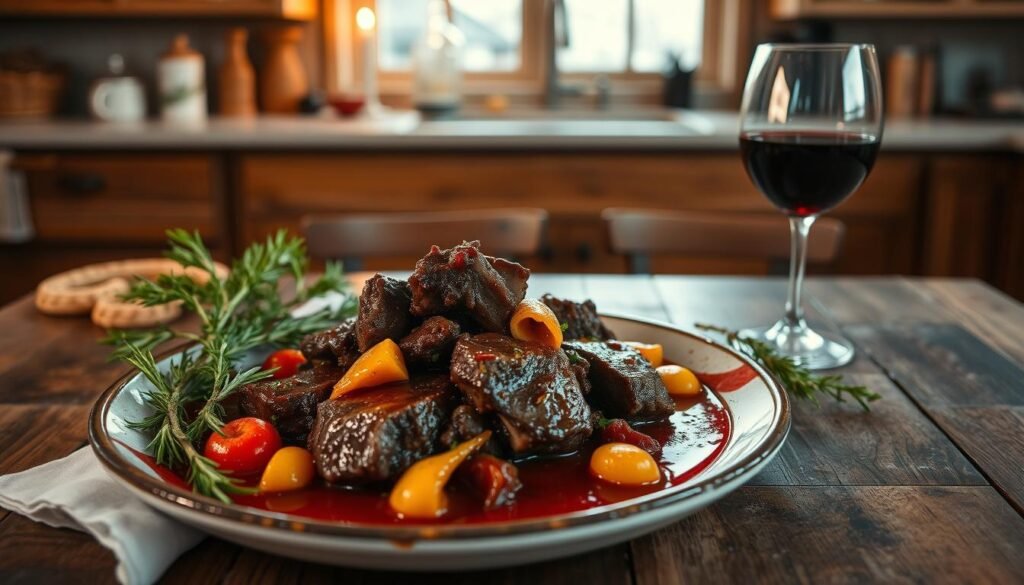
“The magic of a good braise lies in the alchemy of time, heat, and liquid, transforming tough cuts of meat into meltingly tender morsels.”
Vegetarian Options in Northern Italian Secondi
While meat and fish are common in Northern Italian cuisine, there are many tasty vegetarian secondi. These dishes use local, seasonal produce to create hearty and flavourful meals. They are perfect for those looking for vegetarian Italian dishes or plant-based options.
Melanzane alla Parmigiana: Eggplant Parmesan
Melanzane alla Parmigiana is a favourite from Campania. It’s a vegetarian Italian dish made with eggplant, tomato sauce, and mozzarella cheese. This dish shows how important regional vegetables are in Northern Italian cooking.
Polenta e Funghi: Polenta with Mushrooms
Polenta e Funghi is another great vegetarian Italian dish. It combines creamy polenta with wild mushrooms. This dish is a staple in Northern Italy’s mountains, highlighting the area’s regional vegetables.
Northern Italy also has many other vegetarian Italian dishes. You can find Carciofi alla romana (Roman-style artichokes) and dishes with radicchio and asparagus. These plant-based options celebrate the North’s diverse and vibrant culinary scene.
“Italian cuisine celebrates the earth’s bounty, and Northern Italy’s vegetarian dishes prove it. From Melanzane alla Parmigiana’s layered flavours to Polenta e Funghi’s creamy comfort, these plant-based options let you taste the region’s true flavours.”
Seasonal Ingredients in Northern Italian Cooking
Northern Italian cuisine loves seasonal produce. Flavours and ingredients change with the seasons. In spring, fresh asparagus and artichokes are key, often grilled or in frittatas. Autumn brings out root vegetables and chestnuts, perfect for soups and risottos.
Spring Flavours: Fresh Asparagus and Artichokes
Spring in Northern Italy brings fresh green produce. Asparagus is prized, grilled and dressed with olive oil and lemon. Artichokes also shine, in sautés and creamy frittatas.
Autumnal Treats: Root Vegetables and Chestnuts
Autumn brings warmer dishes in Northern Italian kitchens. Root vegetables like pumpkin and carrots star in soups and risottos. Chestnuts add a nutty flavour, seen in Zuppa di Castagne and risottos.
Using seasonal ingredients makes Northern Italian food fresh and vibrant. It shows the region’s love for its land and cooking traditions. Seasonal dishes celebrate the land’s bounty and the kitchen’s artistry.
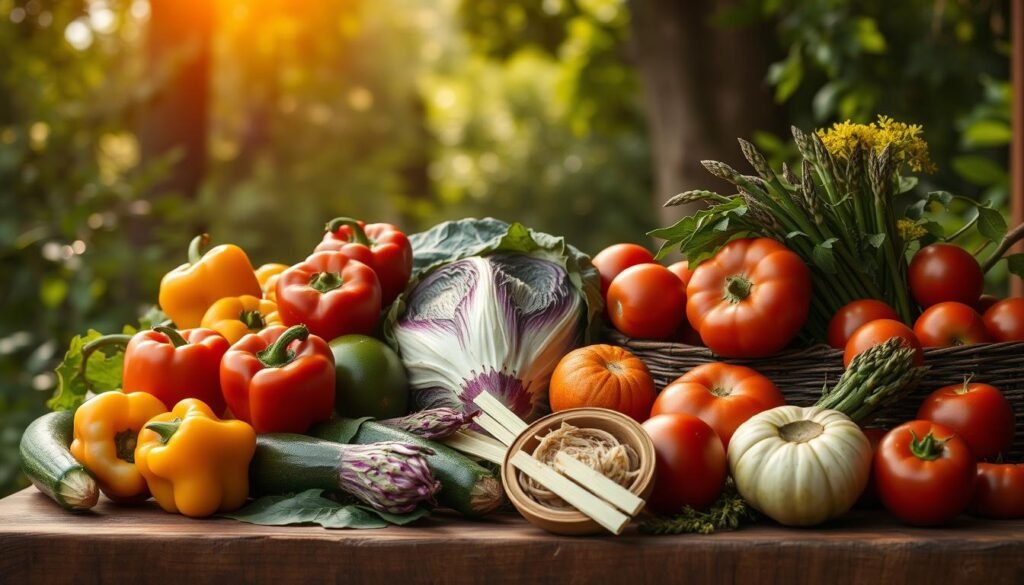
Pairing Northern Italian Secondi with Wine
Wine pairing is key in Northern Italy. The rich red wines, like Barolo and Barbaresco, pair well with meat dishes. These wines, made from Nebbiolo grapes, complement the tender meat of Northern Italian secondi.
The crisp white wines, including Pinot Grigio and Soave, are perfect for seafood. They enhance the flavours of dishes like Branzino al Sale and Fritto Misto. This lets the fish’s pure taste shine.
Sparkling wines, like Franciacorta and Prosecco, add to the dining experience. They pair well with many secondi courses, from meat to fish, and even vegetarian dishes.
Understanding the link between Northern Italian cuisine and wine is essential. It makes every meal a harmonious journey, where each bite is enhanced by the right wine.
Match Made in Heaven: Barolo with Meat Dishes
Barolo wine, made from Nebbiolo grapes, is perfect for Northern Italy’s meat dishes. Its complex flavours of dried cherries, leather, and spice match the rich, slow-cooked meats. This is true for dishes like Brasato al Barolo and Osso Buco.
Crisp Whites: Perfect Pairings for Fish
The vibrant white wines of Northern Italy, such as Pinot Grigio and Soave, are great with seafood. Their acidity and freshness highlight the delicate flavours of fish dishes. This is seen in Branzino al Sale and Fritto Misto.
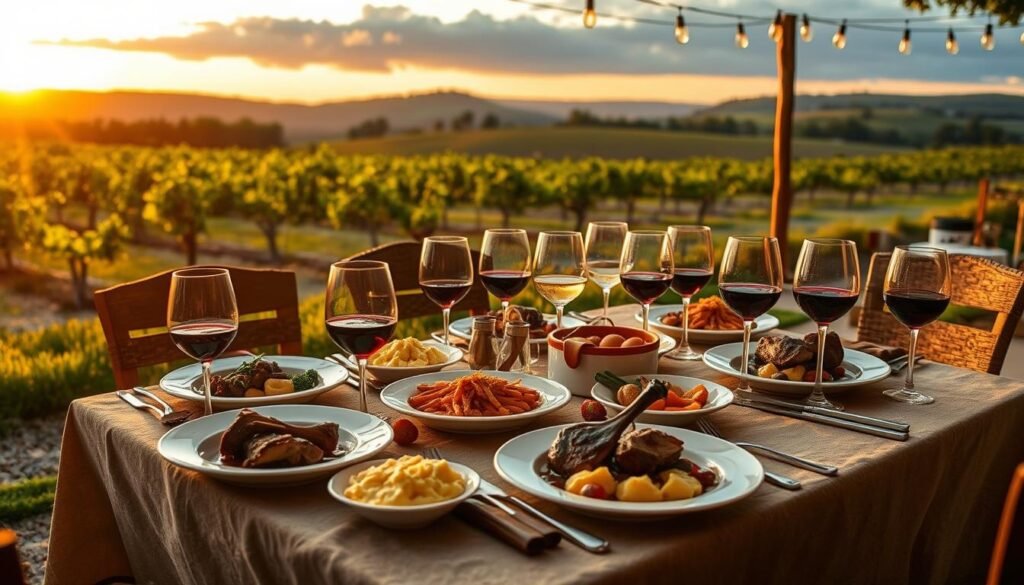
Cooking Tips for Northern Italian Secondi
Learning to make Northern Italian secondi, or main dishes, is all about mastering certain cooking techniques. Whether you’re making a classic osso buco or a rich brasato al Barolo, the details matter a lot. They can really improve your Italian cooking at home.
Techniques for Perfectly Braised Meat
When braising meat for Northern Italian secondi, slow cooking is key. Let the meat simmer in a tasty liquid, like white wine or tomato sauce, until it’s very tender. Make sure to season the meat well with salt and pepper before browning it. This helps keep the flavours in.
Enhancing Flavours with Fresh Herbs
Fresh herbs are essential in Northern Italian cooking. Herbs like rosemary, sage, and basil can make your secondi dishes taste amazing. Use them in the braising liquid and as a garnish to balance the flavours.
To get the real taste of Northern Italy at home, follow these tips. Use the right cooking times, quality olive oil, and let the fresh ingredients be the stars. With these tips, you’ll soon be a pro at making Northern Italian secondi.
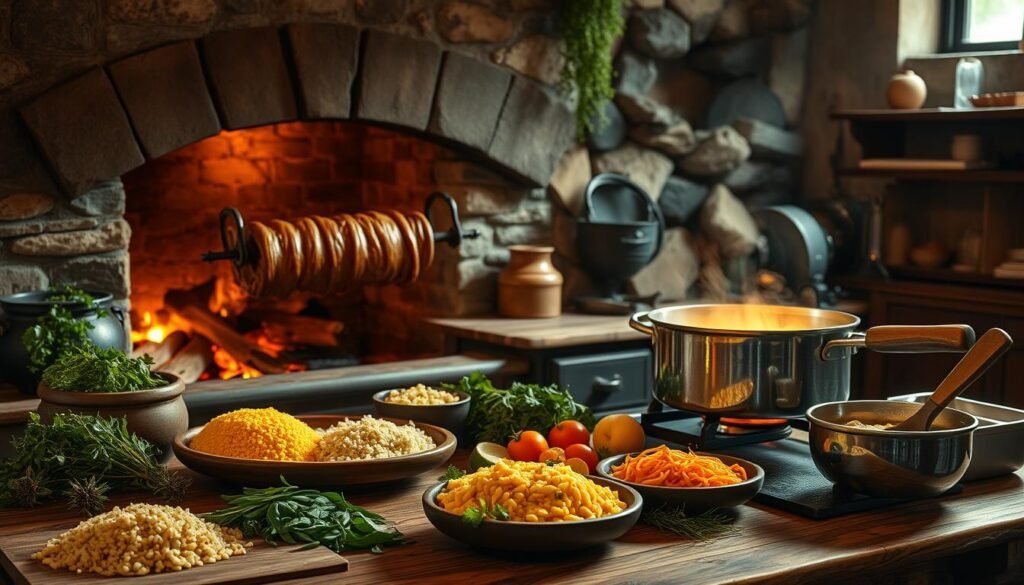
| Technique | Benefit |
|---|---|
| Slow Braising | Tenderizes tough cuts of meat and develops rich, complex flavours. |
| Seasoning with Salt and Pepper | Enhances the natural flavours of the ingredients and creates a well-balanced dish. |
| Incorporating Fresh Herbs | Adds depth and freshness to the dish, elevating the overall taste experience. |
“The secret to great Italian cooking is simple, high-quality ingredients and respect for tradition.”
Conclusion: Embracing Northern Italian Hospitality
Northern Italy’s rich food traditions go beyond just tasty secondi dishes. These meals show the region’s warm welcome and strong family ties. They are key to special times and celebrations. By cooking these dishes at home, you can bring Northern Italy’s flavours and spirit into your life. This creates memorable meals that celebrate this lively food culture.
Celebrating With Family and Friends
Northern Italian food is all about community and togetherness. Meals are more than just food; they’re a time to share stories and bond. As you learn to make these iconic dishes, think about hosting meals with your loved ones. Enjoy the rich flavours and the cozy atmosphere that’s at the heart of Northern Italian life.
Inviting Northern Italian Flavours Into Your Home
The real spirit of Northern Italian hospitality is in the home kitchen. Learning to make these favourite dishes lets you connect with the region’s culinary heritage. From the hearty, wine-braised beef of Brasato al Barolo to the light, salt-baked Branzino al Sale, each recipe opens a door to Northern Italy’s vibrant tastes and traditions. Bring these flavours home and use them to bring people together, make lasting memories, and celebrate the true spirit of Italian hospitality.

